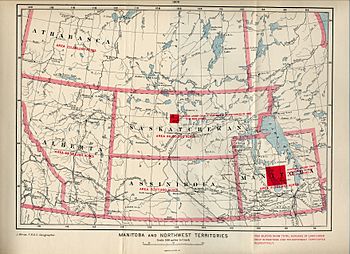Provisional Government of Saskatchewan facts for kids
Quick facts for kids
Provisional Government of Saskatchewan
Gouvernement provisoire de la Saskatchewan (French)
|
|||||||||||||
|---|---|---|---|---|---|---|---|---|---|---|---|---|---|
| 1885–1885 | |||||||||||||

A 1900 map showing the District of Saskatchewan at its greatest extent
|
|||||||||||||
| Status | Unrecognized state, Provisional Government | ||||||||||||
| Capital | Batoche | ||||||||||||
| Common languages | French (Métis French), Michif, Cree | ||||||||||||
| Government | Military dictatorship Republic |
||||||||||||
| Chieftain | |||||||||||||
|
• 1885
|
Louis Riel | ||||||||||||
| Legislature | Exovedate | ||||||||||||
| History | |||||||||||||
|
• Established
|
March 19 1885 | ||||||||||||
|
• Disestablished
|
May 20 1885 | ||||||||||||
|
|||||||||||||
| Today part of | Canada - Saskatchewan |
||||||||||||
The Provisional Government of Saskatchewan was a temporary government. It was declared during the North-West Rebellion in 1885. This government was set up in the District of Saskatchewan. This area is now part of Alberta, Saskatchewan, and Manitoba in Canada.
Louis Riel gave this government its name. He hoped to unite the Métis, Cree, and European settlers. However, most of the leaders were French-speaking and Métis. Gabriel Dumont was the main military leader. But Riel could still make final decisions.
The Provisional Government started on March 19, 1885. It ended after the Métis were defeated. This happened during the Battle of Batoche on May 20, 1885. The government only controlled a small area. This was around the South Saskatchewan River. Other towns like Prince Albert and Saskatoon stayed outside its control.
What was the Exovedate?
The governing council of this provisional government was called the Exovedate. This word comes from Latin and means "of the flock." This council met in Batoche, Saskatchewan. They discussed many things. These included military plans and local rules.
The Exovedate only had real power in the Southbranch Settlement. The provisional government ended when Batoche was defeated. This happened during the Battle of Batoche. Louis Riel was captured a few days later. Gabriel Dumont managed to escape to Montana.
What is the Legacy of the Provisional Government?
The place where the Métis Provisional Government was formed is now a special site. It is called the Batoche National Historic Site. This site has many important places. These include Gabriel Dumont's grave. You can also see the Batoche school and cemetery. There are also Métis rifle pits from the battle.
In 2008, a minister named Christine Tell spoke about the 1885 events. She said the 125th anniversary in 2010 was a chance. It was a chance to tell the story of the Métis and First Nations peoples. Their struggle with government forces helped shape Canada today.
 | Charles R. Drew |
 | Benjamin Banneker |
 | Jane C. Wright |
 | Roger Arliner Young |

